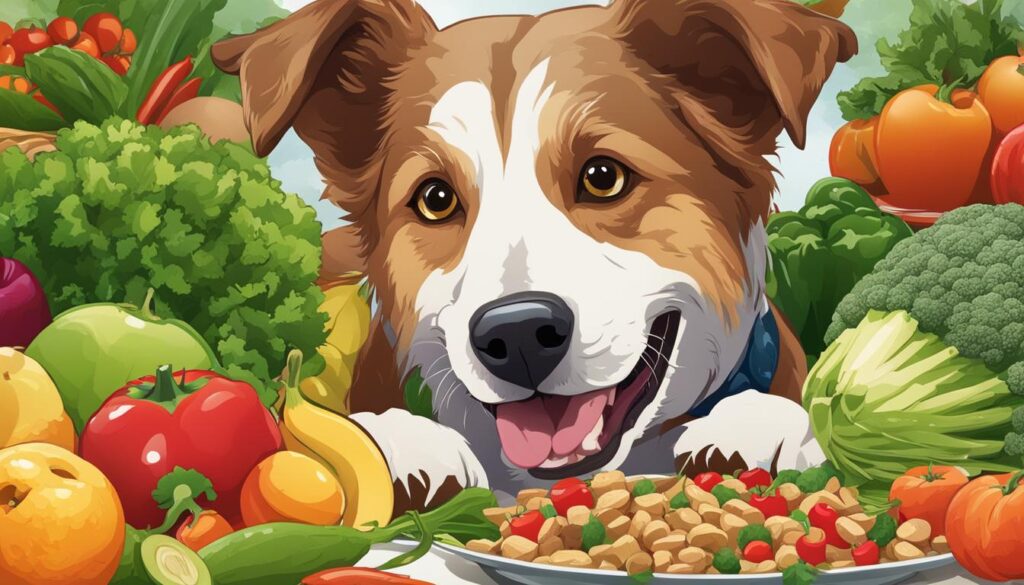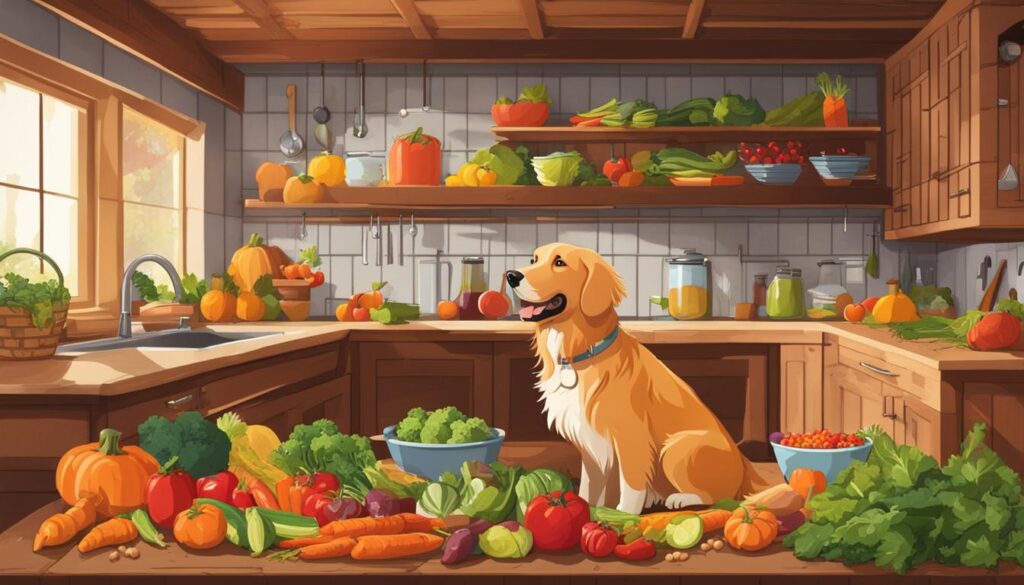Welcome to our DIY Dog Nutrition Guide! As a responsible pet owner, you want to ensure that your furry friend gets the best nutrition possible. In this guide, we’ll provide you with valuable dog nutrition tips and insights to help you make informed decisions about your dog’s diet.
From homemade dog food recipes to understanding the importance of a balanced canine diet, we’ll cover it all. You’ll discover the benefits of healthy dog food, natural dog food options, and even homemade dog treats. We’ll also delve into the world of raw dog food and explore the use of nutritional supplements for dogs.
Our goal is to empower you to take charge of your dog’s nutrition journey by providing you with the knowledge and resources you need. Whether you’re a new puppy parent or have a senior canine companion, understanding their nutritional needs at each life stage is crucial.
So, get ready to dive into the world of DIY dog nutrition and give your pet the healthy, balanced diet they deserve!
Nutrition for Puppies: Building a Healthy Foundation
During the puppy stage, it’s important to provide the right nutrition to support their growth and development. Feed them a high-quality puppy food that is labeled as “complete and balanced” and appropriate for their age and size. Puppies require higher levels of protein and fat to support muscle and tissue growth. They also need an appropriate balance of calcium and phosphorus for bone development and DHA for brain and eye development. Feeding them easily digestible carbohydrates and providing fresh water is essential. Avoid overfeeding and feeding them human food. Gradually transition their food if needed and make sure to socialize and train them alongside their nutrition.
When choosing a high-quality puppy food, look for one that lists a protein source, such as chicken or beef, as the first ingredient. This ensures that your puppy is getting the necessary amino acids for proper growth. Additionally, check the fat content to ensure it provides enough energy for their active lifestyle.
“Proper nutrition during the puppy stage sets the foundation for a healthy adult dog. Providing a balanced diet that meets all their nutritional needs is essential for their growth and development.”
It’s important to introduce new foods gradually to avoid digestive upset. Start by mixing a small amount of the new food with their current food and gradually increase the proportion over several days. This allows their digestive system to adjust to the new diet without any issues.
In addition to proper nutrition, socialization and training are crucial for a well-rounded puppy. Expose them to various environments, people, and other animals to help them develop into confident and well-behaved dogs. Training sessions can be incorporated into mealtime to reinforce good behavior and create a positive association with their food.
| Nutritional Guidelines for Puppies | Recommendation |
|---|---|
| Protein | 25-30% of total calories |
| Fat | 8-10% of total calories |
| Calcium | 1-1.8% |
| Phosphorus | 0.8-1.6% |
| DHA | 0.05-0.1% of total calories |
Remember to consult with your veterinarian to ensure that your puppy is receiving the appropriate nutrition for their specific needs. They can provide personalized recommendations based on your puppy’s breed, size, and overall health.


By providing your puppy with the right nutrition, you are setting them up for a healthy and happy life. Start building a healthy foundation through proper nutrition, gradual food transitions, and positive socialization experiences. With the right care and attention, your puppy will grow into a strong and vibrant adult dog.
Nutrition for Adult Dogs: Maintaining Optimal Health
When it comes to adult dog nutrition, providing a high-quality diet is essential for maintaining your furry friend’s overall health and well-being. Just like humans, dogs require a balanced diet that includes the right combination of proteins, fats, carbohydrates, fruits, and vegetables. Let’s explore the key aspects of adult dog nutrition to ensure you’re giving your canine companion the best.
Essential Nutrients for Adult Dogs
Adult dogs need a diet that is rich in protein to support their muscle health and overall body functions. Look for dog food that lists a high-quality source of protein, such as chicken or beef, as the main ingredient. Fats are also important for providing energy and promoting healthy skin and coat. Opt for dog food that contains healthy fats, like omega-3 fatty acids.
Carbohydrates play a role in providing energy for adult dogs, but it’s important to choose complex carbohydrates that are easily digestible. Fruits and vegetables are also beneficial, as they provide essential vitamins and minerals. Just ensure that any fruits and vegetables you feed your dog are safe and free from toxins.
Portion Control and Regular Feeding Schedule
Portion control is crucial to maintain a healthy weight for your adult dog. Overfeeding can lead to obesity and related health issues. Consult with your veterinarian to determine the appropriate portion size for your dog’s breed, size, and activity level. It’s also important to establish a regular feeding schedule to promote consistency and prevent overeating.
Avoiding Harmful Foods
Some foods can be harmful or toxic to dogs, so it’s essential to avoid feeding them to your adult canine companion. Common foods to avoid include chocolate, grapes, raisins, onions, garlic, and certain artificial sweeteners like xylitol. Always check with your veterinarian if you’re unsure about whether a certain food is safe for your dog.


| Nutrient | Role | Sources |
|---|---|---|
| Protein | Supports muscle health and overall body functions | Chicken, beef, fish |
| Fat | Provides energy and promotes healthy skin and coat | Omega-3 fatty acids, chicken fat |
| Carbohydrates | Provide energy | Brown rice, sweet potatoes |
| Fruits and Vegetables | Provide essential vitamins and minerals | Apples, carrots, spinach |
By focusing on high-quality dog food, portion control, and avoiding harmful foods, you can ensure that your adult dog receives the nutrition they need to thrive. Regular exercise and activity, as well as regular veterinary check-ups, are also important components of maintaining your dog’s optimal health. With proper nutrition and care, your adult dog can live a long, happy, and healthy life.
Nutrition for Senior Dogs: Tailoring for Aging Canines
As your dog enters their senior years, their nutritional needs undergo changes that require careful consideration. To ensure their well-being and longevity, it’s important to provide them with the appropriate diet. This section will guide you through the key aspects of senior dog nutrition, including lower caloric intake, protein requirements, joint health, digestibility, and more.
One of the primary considerations for senior dogs is their lower caloric intake. With reduced activity levels, older dogs are prone to weight gain, which can lead to various health issues. Adjusting their portion sizes and ensuring they receive a balanced diet that meets their nutritional needs is crucial in maintaining a healthy weight.
Protein plays a vital role in maintaining muscle mass and overall health in senior dogs. However, the type and amount of protein they require may differ from when they were younger. Opt for high-quality protein sources that are easily digestible and consider consulting with your veterinarian to determine the optimal protein level for your aging canine companion.
As dogs age, their joints may become stiffer and more prone to arthritis. Including supplements like glucosamine and chondroitin in their diet can help support joint health and reduce discomfort. Additionally, choosing dog food with ingredients that promote digestibility can aid in nutrient absorption and alleviate gastrointestinal issues that are more common in senior dogs.
| Nutritional Considerations for Senior Dogs | How to Address Them |
|---|---|
| Lower caloric intake | Adjust portion sizes and choose a diet that meets their nutritional needs |
| Protein requirement | Opt for high-quality, easily digestible protein sources |
| Joint health | Incorporate supplements like glucosamine and chondroitin |
| Digestibility | Choose dog food with ingredients that promote easy digestion |
In addition to proper nutrition, hydration is vital for senior dogs. Ensure they have access to fresh water at all times and monitor their drinking habits to detect any changes that may signal underlying health issues.
It is equally important to be aware of harmful foods that can pose a risk to your senior dog’s health. Some common foods, such as chocolate, grapes, and onions, can be toxic to dogs and should be avoided. Consult with your veterinarian to create a list of foods to be cautious of and steer clear of when selecting their diet.
Establishing a regular feeding schedule and providing opportunities for exercise and activity are key elements in maintaining your senior dog’s overall health and well-being. Regular veterinary check-ups will enable you to monitor their health and make any necessary adjustments to their diet or lifestyle.
Conclusion
Providing proper nutrition for your dog is crucial for their overall health and well-being. By understanding the different life stages of your furry friend and tailoring their diet accordingly, you can optimize their health and ensure they live a long and happy life.
Consulting with your veterinarian is essential in determining the best diet for your dog at each stage. They can guide you in making informed choices and provide recommendations for DIY dog nutrition. From homemade dog food recipes to natural dog food options, there are plenty of ways to provide a balanced and healthy diet for your canine companion.
When it comes to dog nutrition, it’s important to be mindful of potential additives and harmful foods. Opt for fresh and high-quality ingredients, and prioritize portion control to prevent overfeeding. Don’t forget to provide fresh water for your dog at all times to ensure proper hydration.
Exercise is another crucial aspect of maintaining your dog’s overall health. Regular physical activity can help keep them fit and prevent obesity. Additionally, don’t forget to schedule regular veterinary check-ups to monitor your dog’s health and make any necessary adjustments to their diet.
FAQ
How can I ensure my dog’s nutrition is balanced and healthy?
To ensure balanced and healthy nutrition for your dog, it’s important to feed them a high-quality dog food that is labeled as “complete and balanced” and meets their nutritional needs. Consult with your veterinarian to determine the best diet for your dog’s specific life stage. Additionally, you can consider homemade dog food recipes, natural dog food options, and nutritional supplements for dogs. Portion control, fresh water, exercise, and regular veterinary check-ups are also essential.
What should I feed my puppy to support their growth and development?
To support the growth and development of your puppy, feed them a high-quality puppy food that is labeled as “complete and balanced” and appropriate for their age and size. Puppies require higher levels of protein and fat for muscle and tissue growth. They also need an appropriate balance of calcium and phosphorus for bone development and DHA for brain and eye development. Feeding them easily digestible carbohydrates and providing fresh water is important. It’s crucial to avoid overfeeding and feeding them human food.
What should I feed my adult dog to maintain optimal health?
To maintain optimal health in your adult dog, feed them a high-quality dog food that is labeled as “complete and balanced” and meets their nutritional needs. Adult dogs still require protein and fat, but the levels may vary based on their activity level. Carbohydrates can provide energy, and fruits and vegetables can provide vitamins and minerals. Practice portion control, provide fresh water, and avoid feeding them harmful foods. Establish a regular feeding schedule and consider any special dietary needs they may have. Encourage exercise and activity and schedule regular veterinary check-ups.
How should I adjust my senior dog’s diet to meet their changing nutritional needs?
As dogs age, their nutritional needs change. Senior dogs require a lower caloric intake to prevent weight gain. Adequate protein intake is important for muscle maintenance. Consider supplements for joint health and choose easily digestible dog food. Ensure hydration, avoid harmful foods, stick to a regular feeding schedule, and provide exercise and activity. Regular veterinary check-ups are essential to monitor their health and make any necessary dietary adjustments.
Why is it important to consult with a veterinarian about my dog’s nutrition?
Consulting with a veterinarian about your dog’s nutrition is important because they can provide personalized recommendations based on your dog’s specific needs and life stage. They can help you determine the best diet for your dog and address any concerns or special dietary requirements. Regular veterinary check-ups are also crucial for monitoring your dog’s overall health and making any necessary adjustments to their diet.

